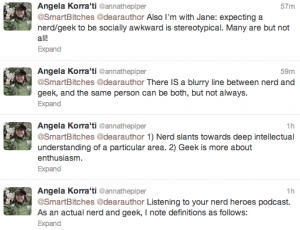If you pay any attention to popular media you may be aware that actor Simon Pegg got a bit of an outcry hurled at him for remarks that gave the impression that he thought love of science fiction is making us childish. Enough of an outcry that Pegg has since clarified his position, and I have to give the man credit for being eloquent about what he actually meant.
I mention this not because I want to argue with (or about) what he has to say necessarily, but rather, because it provides context for what I do want to talk about: i.e., why society at large deems SF/F, comic books, etc., as “childish”.
IO9’s article and Pegg’s post both point out quite correctly that there are innumerable examples of genre work that tackle very weighty themes, thank you very much. Yet this perception of genre as childish still remains. The notion of a lover of SF/F, a nerd, a geek, whatever you want to call him or her, as being a loser still living in the parental basement is still very prevalent. And more than once, I’ve seen ideas and tropes that are common parlance among genre authors get roundly dismissed by the broader public–until a literary author comes along and does something with them, at which point suddenly they’re worth taking seriously. (Justin Cronin’s The Passage and Lev Grossman’s The Magicians, I’m looking at YOU.)
Time and time again, geekdom is accused of not being aware of the real world, because we happen to love stories with giant robots in them. Or superheroes. Or fellowships banding together to escort a hobbit to Mordor so he can throw a magic ring into the only volcano that’ll destroy it.
We continue to be stereotyped as socially inept. Find the nerd character in any popular television sitcom and chances are very, very high that that character will be shy and awkward. Ditto for any character who’s a scientist. You never see the beautiful characters lighting up with eagerness at the thought of going to see the next Marvel movie release, or being prepared to debate the merits of Tolkien. You never see a serious scientist character–a character doing actual science on screen, as opposed to a character who’s just wearing glasses as a shorthand for ‘Hi, I’m smart!’–also being perfectly capable of handling herself in a social situation.
We’re dismissed as politically ignorant, too. Which is particularly maddening, given the political divisiveness I’ve seen within geekdom itself over the last several years, a microcosm of the political divisiveness of society at large. (Look no further than the Hugo controversy this year for a very telling example of this.)
Geekdom absolutely is politically aware. Go take a look at how Tumblr, for example, responds to political issues. And yes, Twitter too. If you’re on either of these sites and you’re not seeing geekdom talking about these things, you’re not following the right people or reading the right hashtags. I guarantee you, the conversations are there. But all too often, if we speak up about any given political topic, we’ll either get shouted down as “social justice warriors” who apparently care about the wrong political topic, or that we care about it in the wrong way.
It’s all maddening, and it’s all almost entirely bullshit. I won’t deny geekdom often has its collective head in the clouds, oftentimes because we need to as a coping mechanism; there is, after all, a very well known filksong called “Rich Fantasy Lives” that addresses this very topic.
What I want to know is, this is bad why, exactly?
What, exactly, are grownups supposed to be thinking about? The whole narrative of “spouse, house, car, 2.3 kids and a dog and a cat?”
I look around the geek community, and I see a whole bunch of people who struggle to achieve these very goals–not because they aren’t paying enough attention to them, or because of what they love to read or love to watch, but because these goals are fucking difficult to achieve. Houses are expensive. Cars are expensive. Particularly if you have to juggle acquiring them against the craptastic state of the American healthcare system (because I’m tellin’ ya, when people have to turn to GoFundMe to raise money for their own medical care, something is seriously fucked up), and the craptastic state of the American job market, and the craptastic state of the American political climate. (See previous commentary re: geekdom as a political microcosm.)
And then, when we geeks fail at fulfilling this narrative, we get blown off as “oh, clearly you’re not successful because you read too many fantasy novels.”
Fuck that. In the words of the immortal Adam Savage, “I reject your reality and substitute my own.”
And my reality is, if I want to go watch a movie about giant robots fighting kaiju, then I’m going to damn well go watch that movie. Sometimes it’ll be because I’m tired from a long day of using my brain at work. Sometimes it’ll be because I’m exhausted from all of the aspects of today’s society that I am bloody well paying attention to, thank you, and I need to go do something else or else I’ll give myself high blood pressure from all the things I’m angry about. Sometimes I just want nothing more than to watch robots fighting kaiju.
And that’s okay. Also: robots fighting kaiju is awesome.
And if that makes me childish, so be it. I submit that more so-called grownups could stand to be reminded of some of the finest things about childhood are: i.e., the sense of wonder, the imagination, the joy.
Our world would be a happier place for it.

